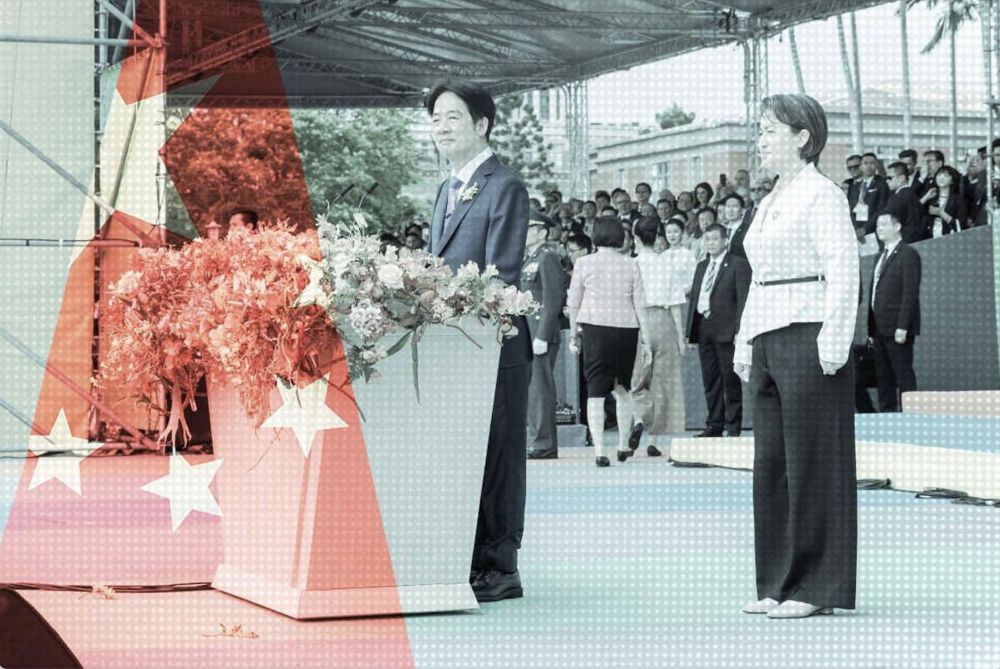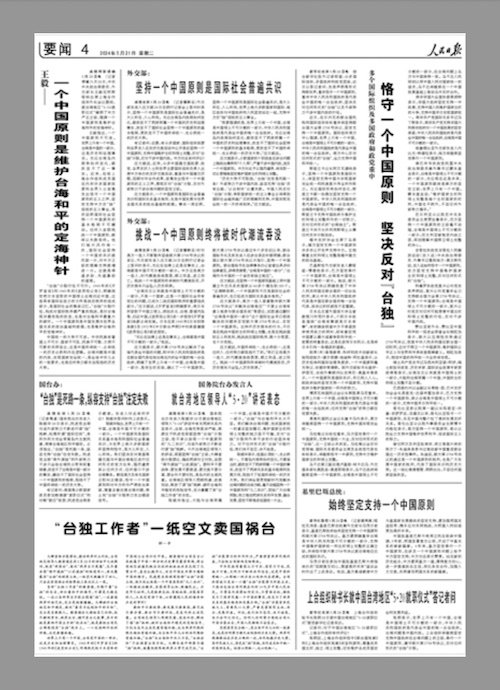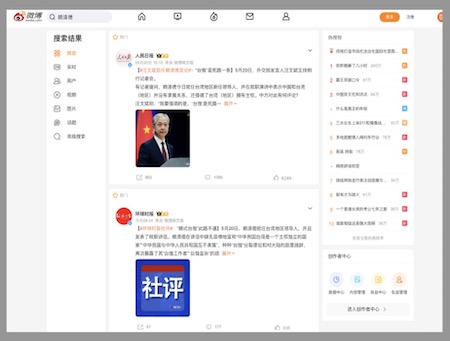
Those who play with fire will get burned. As Lai Ching-te (賴清德) was sworn in yesterday as the fifth democratically elected president of the Republic of China (ROC), the official name of Taiwan, seething sentiments like this one blazed across China’s official media.
Such language contrasted sharply with Lai’s message of “peace and mutual prosperity” (和平共榮) for both sides of the strait, delivered during a lively ceremony outside Taiwan’s Presidential Office whose theme for the day focused on national unity and democratic values: “Weaving Taiwan together; progressing democracy.”
Fiery Rhetoric
In a commentary on Lai’s speech posted online shortly after midnight today, China’s official Xinhua News Agency painted a portrait of Lai as a vocal proponent of what it called “the separatist fallacy of ‘Taiwan independence.’” In typical fashion, the headline — which included the fiery reference above — referred to Lai only as “the regional leader of Taiwan” (台湾地区领导人), emphasizing China’s claims to sovereignty over the islands.
Line by line, the Xinhua commentary dissected Lai’s speech, exposing what it claimed to be deceitful and separatist undertones, and responded with emotive and polemical attacks. Lai, it said, was a “worker for Taiwan independence” (台独工作者); a “troublemaker” (麻烦制造者). According to the news agency, his speech was “a naked confession of Taiwan independence.”
Lai’s message of peace and mutual prosperity was brushed aside. “The hope for cross-strait dialogue, exchanges, and cooperation is false,” said the Xinhua commentary, “and the continued deterioration of cross-strait relations is true.” The article urged the Taiwanese to oppose independence and support unification.
With even harsher language, the Cross-Straits Voices channel of the CCP’s official China Media Group (CMG) adopted an adversarial tone. In the face of efforts toward Taiwan’s independence, it said, “peace in the Taiwan Strait is like fire and water” (台海和平水火不容).
Lai’s message of peace and mutual prosperity was brushed aside.
The channel characterized Lai’s speech, which focused on the four themes of stability, self-confidence, responsibility, and solidarity, as a blatant attempt to “lean on foreign [countries] to push independence” (倚外谋独), “internationalizing” the Taiwan question. The commentary was chockful of snide and aggressive characterizations of Lai’s words and intent. He “stubbornly adhered” (顽固坚持) to the notion of Taiwan independence, or “blatantly propagandized” (大肆宣扬) it. And he “incited” (煽动) the people of Taiwan to “hate and fear China” (仇中恐中).
By the outlet’s admission, there was nothing Lai could say to alleviate China’s concerns about his Democratic Progressive Party (DPP), which has now won its third consecutive four-year presidential term — a first since Taiwan held its first direct presidential election in 1996. “No matter what Lai says or how he says it, nothing changes the fact that both sides of the Taiwan Strait belong to one China,” said the outlet.
The CMG piece was widely syndicated across Chinese websites and social media channels, often identified as being from “Watching the Taiwan Strait” (看台海), a social media brand under CMG. The article appeared in such outlets as the Shanghai Observer (上观), an online publication under Shanghai’s official Liberation Daily (解放日报); Guangming Daily Online, a website operated by the Central Propaganda Department’s chief newspaper, and the myriad social media accounts of Global Times.
The article was also shared through “Watching the Taiwan Strait” accounts on foreign social media platforms, including Facebook and YouTube, where its official CCP affiliations are not clearly labeled.
Full-Page Fury
In today’s edition of the CCP’s official People’s Daily newspaper, the entire space of page four is devoted to official responses to Lai’s inauguration in Taiwan — with nine separate pieces in all.
Along the left-hand margin of the page is a report from Astana, the capital city of Kazakhstan, where Wang Yi, visiting to attend a meeting with ministerial members of the Shanghai Cooperation Organization (SCO), is quoted as emphasizing that “the one-China principle is the lynchpin for maintaining peace in the Taiwan Strait.” This is followed to the right by a pair of statements from the Ministry of Foreign Affairs (MFA).

Another large article on the page gathers together several international remarks that affirm China’s sovereignty over Taiwan — a typical tactic in CCP propaganda, which historically relies heavily on foreign voices. The voices ostensibly supporting China on the Taiwan question include the speaker of Sri Lanka’s parliament, a spokesperson from Pakistan’s foreign ministry, a Congolese education official, parliamentary speakers from Botswana and Malawi, and a deputy prime minister of Uganda, to name just a very few.
But one of the strongest tones comes at the bottom of the page, in a commentary attributed to “Zhong Yiping” (钟一平). This is almost certainly a homophonous official pen name for an opinion representing the central CCP leadership. In many such pen names, the character “Zhong,” literally “bell,” is a stand-in for China. In this case, the second two characters in the name likely refer directly to “one China” and “peace” — essentially a homophone of the notion of “peaceful unification.”
Not surprisingly, the need for “peaceful unification” is the central theme of this page-four commentary, which concludes by urging both sides to “jointly pursue the bright future of peaceful unification.”
Social Silence
Today, as yesterday, social media platforms inside China are restricting posts and searches about Taiwan’s newly inaugurated president. As Chinese-language outlets outside China have reported, searches on the popular Weibo platform for the hashtag “#Lai Ching-te” (#赖清德) turned up a message yesterday that read: “According to relevant regulations and policies, the content of this topic cannot be displayed.”

Searches today on Weibo for “Lai Ching-te” do yield results — with one serious limitation. All of the posts listed in the search results are from CCP-run media, listed hierarchically. At the top is the official account of the People’s Daily, followed by its spin-off, the Global Times.
Historically, elections in Taiwan have been a topic of interest for internet users in China, and the authorities are keen to contain and “guide” any related news and discussion. During Taiwan’s presidential election back in January, Weibo censored all hashtags associated with the presidential elections in Taiwan, which briefly trended.
Thanks to China’s conscientious filters on Taiwan, any curious reader in China who tries to search “Lai Ching-te” on social media will be faced with a wall of fire and fury.
Additional research contributed by David Bandurski.




















